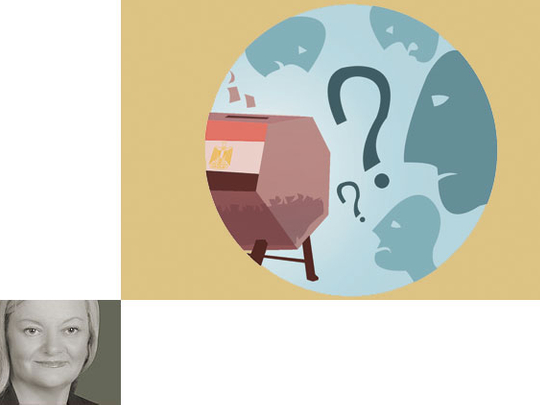
Democracy has become a minefield peppered with nasty surprises for Egyptian voters. The acrimony swirling around most candidates amid rumours that at least one is married to a belly dancer and another’s mother was a Jewish spy for Israel is so thick it makes the run-up to the US presidential election look like a love-fest. As someone who’s been based in Egypt for more than eight years, I would love to be able to outline the current state-of-play but it’s almost a daily shape-shifter.
The liberals are the biggest losers. One of their biggest hopes, former IAEA chief Mohammad El Baradei, threw in the towel some time ago while another, Ayman Nour, who dared to challenge Mubarak during the 2005 elections, was kicked from the race on Saturday by the Egyptian electoral body due to a past criminal conviction.
Islamist parties were also hit on Saturday with the exclusion of most of their frontrunners. The Salafists’ favourite, Hazem Salah Abu Esmail, a lawyer who holds to a strict interpretation of Islam, was deemed ineligible because his mother allegedly holds dual Egyptian/American nationality even though a court had instructed the Ministry of Interior to confirm her status with documentary proof. But it looks as though he’s not taking his exclusion with equanimity. His lawyer accused election officials of disqualifying him on orders from the Supreme Council of the Armed Forces (Scaf) and warned of a “major crisis” within hours of the decision. The country’s belly dancers must be relieved; Abu Esmail was determined to banish such entertainers of “drunken men”. Under his rule scantily clad foreign tourists would have been segregated while he planned to permit marriage for couples entering puberty. His biggest sell was the liberation of Egypt from the boot of Israel and Western powers.
Likewise the Muslim Brotherhood’s leading light, the self-made millionaire Khairat Al Shater, who promised to introduce Sharia law, is out of the game because of his criminal record. This leaves the Brotherhood with just one remaining candidate introduced as a last minute back-up: Mohammad Mursi, which isn’t a name that trips easily off most voters’ lips.
However, Islamists who gathered in Tahrir Square on Friday to protest against the nth-minute addition of Egypt’s former intelligence chief Omar Sulaiman to the candidates’ roster will, no doubt, be satisfied that he’s gone too. Sulaiman shocked the nation by registering his campaign on the very last day permissible with the names of 50,000 citizen-backers, 20,000 more than the requisite 30,000. However, the Electoral Commission took the view that around half his registered recommendations were problematic.
I must say that I was taken aback to hear of Sulaiman’s bid as he was prominent in Mubarak’s old guard. At first, I thought he must be delusional, surely no one in their right mind would want him, but when I spoke with Egyptian acquaintances I was stunned to discover that many of them said they would indeed vote for him because he was the one man who could deliver law-and-order and keep Islamist agendas at bay. Sulaiman has pulled no punches in his criticisms of the Brotherhood which he accuses of “hijacking the revolution”, making threats on his life and torching government buildings. He has threatened to lift the lid on his intelligence black box to dish the dirt on prominent Brotherhood and Salafist leaders, Wikileaks-style.
Moreover, a poll published in the Egyptian daily Masry Al-Youm a few days ago indicated that Sulaiman is highly popular among males and the less educated— and, within days, had lured 20 per cent of voters into his camp. I can only conclude that there’s a growing appetite in the country for normality which many feel only a strongman can deliver. Furthermore, there appears to be a swing away from Brotherhood and Salafist parties which, last year, were able to call out millions of demonstrators whereas following their appeal on Friday for a million-man turn-out, only 20,000 or so showed up.
Simultaneously, I detect that ordinary folk are losing their appetite for revolution; the poor are more interested in laying their hands on elusive butane gas cylinders essential for cooking. The relatively wealthy are more concerned with stability that will permit the economy to be kick-started rather than who’s nominally at the helm; I say ‘nominally’ because the bottom line is that for the foreseeable future the Scaf will remain the hand that rocks the cradle.
Like Abu Esmail, Sulaiman isn’t about to accept the Electoral Commission’s decision lying down. They, along with the other eight who’ve been disqualified, have 48 hours to appeal which they intend to do.
So who’s left? Former Arab League chief Amr Mousa who’s leading the race according to an Al Ahram poll is still very much in the running and so is the moderate Islamist Abdul Moneim Aboul Fotouh, a physician who was ejected from the Muslim Brotherhood for independently throwing his hat in the ring.
If anyone tells you they can predict the election’s outcome, don’t believe them; it’s as unpredictable as British weather. All will be revealed on June 21 but, then again, in post-revolution Egypt nothing but nothing is written in stone.
Linda S. Heard is a specialist writer on Middle East affairs. She can be contacted at lheard@gulfnews.com Some of the comments may be considered for publication.









